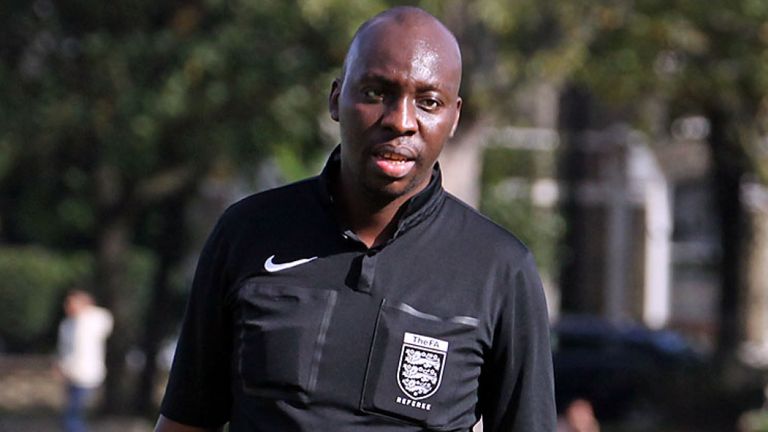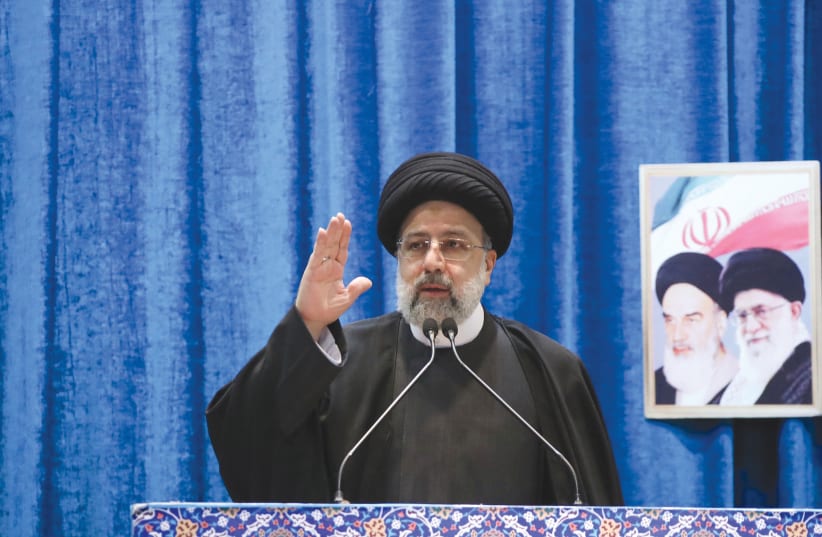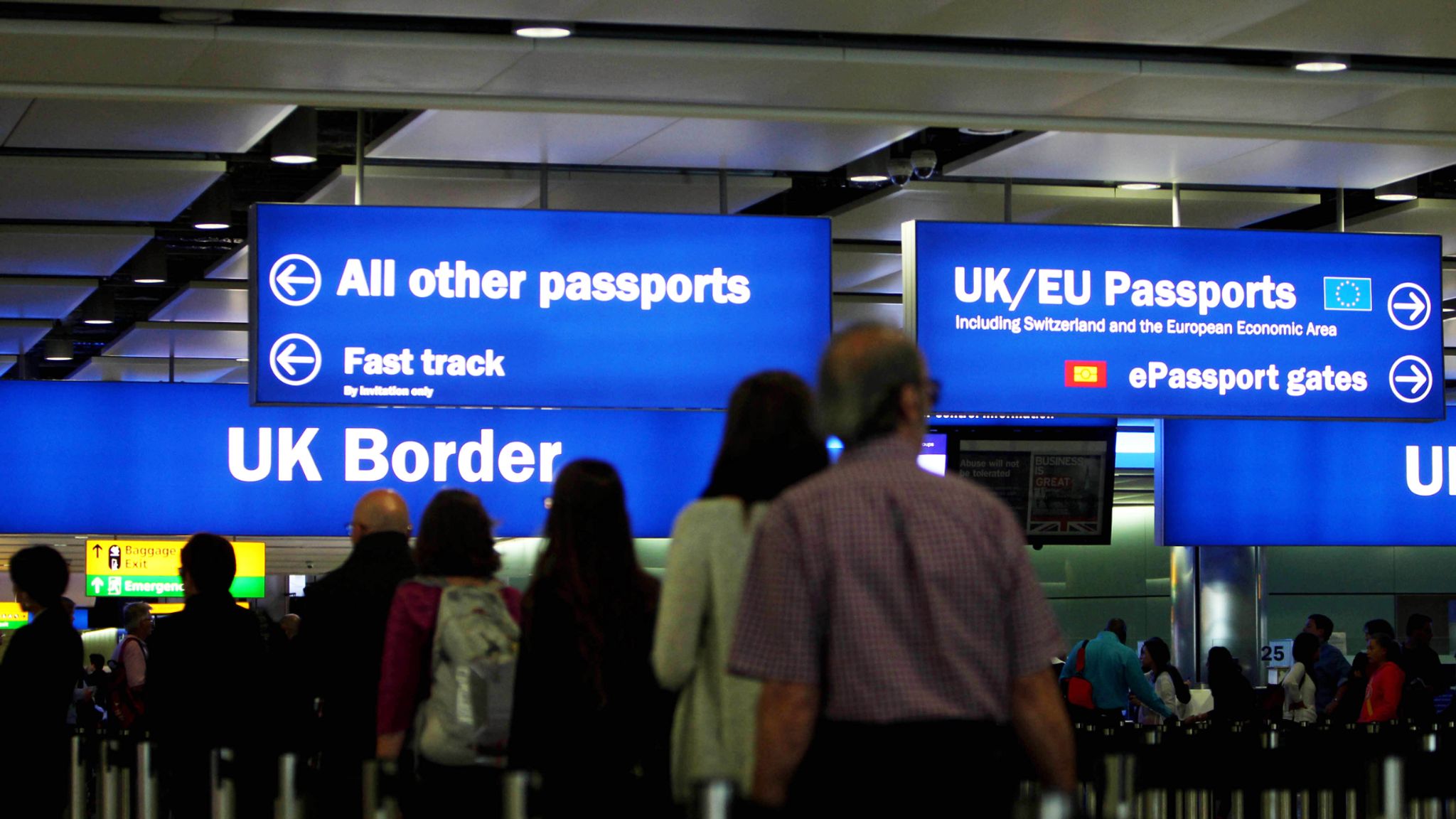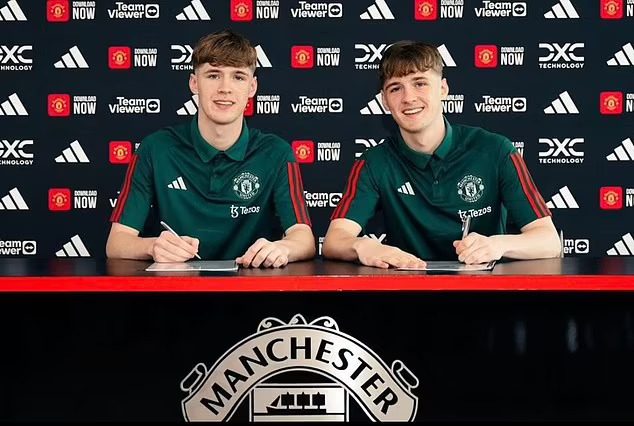It’s a Sunday league game in west London, and the man in the middle is attempting to let the game flow.
This is not much like the Premier League football which referee Raymond Mashamba used to watch on TV, when he was 5,000 miles away in Zimbabwe. However, even on a wet and windy afternoon, he feels a sense of comfort while out on the pitch, different to how football felt back home.
In the last couple of months, Mashamba has been taking charge of matches involving the London Titans and other teams in the LGBT-friendly London Unity League. Set up in 2006, it is an outlier division on the football pyramid but has been affiliated to the Amateur FA since August. He has also refereed in the GFSN National League, which is the world’s only national LGBT football league. Until recently, he never knew either division even existed.
Just five months ago, he was officiating at an international tournament, even making sports headlines around the world for instigating a football novelty – the first use of a ‘green card’ to an errant player in a match.
They said, ‘today we made history – you’re the first’. The next day, I had a message from my mum saying ‘we saw you on TV, on Sky Sports News’.
Raymond Mashamba on his ‘green card’ moment
Yet, less than a week after that moment, Mashamba’s world was suddenly thrown into turmoil. Another newspaper headline followed, as damaging as any could be, and he knew his life would never be the same.
A tall, softly-spoken man with an easy-going nature, Mashamba has the quiet confidence and assurance often associated with referees. Off the field, the journey that has taken him to this small corner of the British amateur game could hardly have been more turbulent.
It is a tale of secrets, betrayal and fear, but ultimately hope – the hope that he can remain part of the football fraternity that has welcomed him in the UK. “For the first time in my life, I have felt free,” he tells Sky Sports. Soon, he will learn if that freedom can continue.
This is Raymond’s story.
***
Raymond arrived in the UK on a flight from South Africa in late May, as part of the travelling delegation of the Matabeleland Football Confederacy. The team from western Zimbabwe was one of 16 taking part in the CONIFA World Football Cup, the ‘alternative’ international tournament that was held in London before all eyes turned to Russia 2018.
CONIFA’s offering, featuring squads of players representing stateless nations, diasporas and regions otherwise unrecognised by FIFA, was a counter-culture fringe event to the World Cup; matches attracted average attendances of around 300 to non-league grounds across the capital. It was a celebration of football’s unfailing ability to bring different peoples together, regardless of politics or creed.
For almost everyone from Matabeleland, including Raymond, it was the first time they had travelled outside of Africa. “I was really excited, but nervous,” he says. He was supposed to be part of a group of four referees making the trip, but the other three had all failed to secure visas.
That presented a significant concern to Raymond as, in the preceding months, one of them had been blackmailing him in an attempt to get on the plane.
Local connections had helped get Raymond nominated for the role. He is not one of Zimbabwe’s leading referees (he has officiated in the second tier, not the top-flight) but his hometown of Bulawayo is the de facto capital of Matabeleland. Soon after the team’s qualification for the CONIFA tournament had been confirmed in September 2017, he was invited to join the group of officials that would also travel to London, alongside the players.
In his late 20s, still living at home with his mother (his father having passed away when he was only a year old), Raymond had recently completed a degree in disaster management. He had a girlfriend, introduced to him the previous year by his uncle, and a broad network of family and friends. He was relatively well known in the football-mad Bulawayo community through being a referee. He was also a very private person, with good reason.
“I’ve known from the age of about 14 that I’m gay,” he says. Even now, aged 30, it is clear it feels unusual for him to say the word out loud.
There was only one place in Bulawayo where he could ever feel safe to discuss his sexuality openly – at the human rights meetings he would attend. Even that was a huge risk in a country where discrimination and violence against LGBT people is standard behaviour, where a same-sex relationship can land you in jail, and where comments made by President Mugabe about homosexuality over 20 years ago – “these people… behave worse than dogs or pigs” – are still repeated now by everyday people, even after the dictator was deposed.
Soon after Raymond started going to these meetings, he met the man who would later become his boyfriend. “He was also dating girls but we were committed to each other. We knew that it was necessary to hide.” They were successful in doing so, but the combination of guilt from lying to his ‘girlfriend’ and the pressure from his mother to start a family became increasingly difficult to bear for Raymond.
He tried to be what they wanted him to be, despite the pain of his inner conflict. At the start of this year, he also found out he was going to become a father.
Raymond and his boyfriend continued to meet in secret. Meanwhile, excitement was growing in the community ahead of the forthcoming CONIFA tournament in London. Raymond knew he would be going, but the full list of officials was yet to be confirmed.
One day in February, one of Raymond’s friends in refereeing came to his house. “He knew we still needed another ref to come with us to London and he wanted to speak to me about it.” Raymond was with his boyfriend; his mother was at work.
“It was only us there. I simply don’t know how I forgot to lock the door.” It’s a moment he says he has thought about repeatedly in the intervening period, the most critical in the whole chain of events. “He saw us in bed together.” For how long, Raymond is unsure. The friend would later claim it was long enough to take pictures on his phone, maybe even video.
“We started begging him not to tell anyone. We were panicking. Eventually, he promised he would keep the secret if I was able to take him to the tournament in London.”
Raymond says he had little choice but to try and do what was asked of him. He was even able to stay on friendly terms with his blackmailer, hoping he could facilitate his demands – and he did manage to get the man added to the list of referees.
However, the costly visa process proved insurmountable. “We were told we needed extra money at the last minute of our preparations. I managed to get some from my sister in Cape Town, but he couldn’t raise enough money to get his.” It was the same story for the other two officials in the group; some of the players missed out too.
“I wasn’t sure what was going to happen. But I talked to the guy before coming – he said he wasn’t going to do anything about it. I still felt we were friends. He asked me to bring him back some kit and other things from London.
“I felt I’d tried my best – and he saw that I had tried. There was nothing more I could have done.”
***
Raymond’s first tournament assignment in London was refereeing Abkhazia’s 3-0 win over Tibet at Enfield FC. Far away, friends and family were able to watch live, as every game was being streamed online.
“I was getting messages like ‘we’re happy for you, you’re representing us, you did a great job’. My boyfriend and I were talking every day too. I told him, don’t worry. I thought I could trust the referee who had found us together – we had been friends.”
Two days later, and a second appointment – Padania vs Tuvalu in Haringey. In their Group C opener, Padania (a region of northern Italy) had beaten Matabeleland 6-1. “It was easier to referee than the first game. Padania were a much better team. But there was also more abuse.” Tuvalu were 6-0 down at half-time and their frustration was evident. “Sometimes I couldn’t understand the language, but you could see from the reactions.” The highly-competitive Italians responded in kind.
Raymond had the opportunity to tackle this dissent, via a new weapon in the CONIFA referees’ disciplinary arsenal – the green card. A GAA-inspired suggestion from sponsors Paddy Power, the card is an intermediate measure designed to curb bad behaviour and diving. Instead of showing a red card, a ref could brandish a green which means the offending player must leave the field of play but can be replaced by a substitute.
“On the opening day of the tournament, no one showed it. My game was the second on day two.” At half-time, Raymond mentioned the Tuvalu players’ worsening mood to the referees’ chief. “He said it was a great opportunity to show the card. So when one of the Tuvalu players pushed an opponent, I called him back and showed the green.
“A couple of minutes later, I got some abuse from a Padania player so I showed the green again. After the game, their physio even came to me and apologised. He said, ‘we know you don’t know what he was saying… we agree it was a green card, or even a red card. We cannot tell you what he said because it was very offensive’.
“The player later apologised to me in the hotel. I told him that what happened stays in the 90 minutes.”
The CONIFA officials would gather that evening for a debrief, with Raymond’s actions the main point of discussion. “In the meeting, they said, ‘today we made history – you’re the first’.
“The next day, I had a message from my mum saying ‘we saw you on TV, on Sky Sports News’.” The footage of him showing the green card was running on the channel, and also on the website. It was being seen around the world, with Raymond’s name mentioned.
With interest in the laws of the game always high, other outlets soon picked up on the incident, and it quickly went viral. “I didn’t think it was going to be such a big story,” says Raymond.
When it did break, he worried what the reaction of his blackmailer would be. “I had a message from him saying, ‘You know you still owe me?’ I thought he might try and do something. I asked my boyfriend to go and see him, and the two of them talked. But he was saying he wasn’t angry.”
Raymond was fourth official for his next two games, as a cut on his foot was limiting his mobility. The injury had improved enough for him to run the line as an assistant referee on the tournament’s final day, but by this stage, his off-field worries were high. His boyfriend was no longer responding to messages. Then after that last match, his phone started buzzing.
“It was my mum claiming she had found pictures in the house, and that the whole community knew about me.” The exchange of messages was brutal, his worst fears realised. “She told me not to come back home.”
The blackmailer had divulged the secret Raymond had held for so long. “I spoke to my sister in Cape Town who knew from my mum. She said she wouldn’t take me in either. I was supposed to visit a cousin of mine in London before flying back, but my mum had told him too. He said not to come.”
The Matabeleland players were beginning to pack up their belongings at the hotel. “I couldn’t speak to them either. I had no one.” Now in a state of panic, he searched online and read about an LGBT refugee group in Leeds. “I just went out with a bag of clothes, to the station, and got on a train.”
Raymond only had a little money, not enough to afford a room when he arrived in Leeds. During the tournament, accommodation and food had been provided by the organisers, but having felt unable to tell them about his situation, he was – for now – on his own.
When he ran out of cash, he could no longer top-up his phone and could not search online for help, or communicate with anyone. He ended up sleeping rough outside Leeds station for several nights. During this time, his bag – containing his passport – was stolen.
A member of a local church group, handing out food to the homeless, listened to Raymond’s story and introduced him to a Pentecostal pastor. “He let me stay with him and his family. They were very good to me. I told them I had nowhere to go.
“They explained I had to call the Home Office, who told me to travel down to Croydon for a meeting. So after a week or so, I went back to London on the night bus.”
After waiting a whole day, Raymond was eventually granted an interview. He was told that, at an appointed time within the next fortnight, a car would collect him and take him to a detention centre in Wakefield, where he would have to stay until accommodation could be found for him while his asylum case was being processed.
He chose to return to Leeds, to the pastor who had first taken him in, and wait. “He let me stay again. He’s a hero to me.”
Two days after that trip to Croydon, Raymond awoke to find a message on his phone – topped up again – from CONIFA’s general secretary, Sascha Duerkop. “He told me that they’d been contacted by some of the Matabeleland players about a story in the local newspaper.
“I said that I didn’t know of any article. He read me the headline – ‘Match official in gay storm’ – and asked me if it was true.
“I was shocked. I hadn’t even told the pastor about any of that. I explained to Sascha that this was my secret.”
The article had been published prominently in the sports section of one of Zimbabwe’s leading Sunday newspapers, and also online.
“A Zimbabwean match official who recently took part in the 2018 CONIFA World Football Cup held in the United Kingdom is in an eye of a storm,” read the opening line. “Allegations have emerged that he was caught in a compromising position with a male companion.”
Raymond’s name was not mentioned in the article, but there was no need. After extensive coverage of the ‘green card’ story, sports fans in Zimbabwe already knew he was the only referee from the country to go to the tournament. In case there was any doubt, the article continued: “The referee (name withheld) got rave reviews for his sterling performance and being among the first to implement some new rules in the game, but was left with egg on his face after news filtered through that he could be ‘bisexual’.”
The damage was done. “Until that point, I was still thinking I might be able to go home,” says Raymond. “Sascha said CONIFA would support me. But my mum started sending me more messages, saying she’d had to step down from her position at church, and that someone said the newspaper had pictures of me. I tried calling the guy who blackmailed, but he wouldn’t answer. They removed me from all the WhatsApp groups.”
The one person Raymond wanted to talk to most was missing. Even now, he has not heard anything from his boyfriend since the last day of the CONIFA tournament, when their secret relationship was first revealed. “That’s what’s distressing me most – that I’m the one who put his life at risk.”
Raymond spent the whole of July in the crowded ‘Initial Accommodation Centre’ in Wakefield, with around 500 other asylum seekers and refugees – men, women and children. He calls it “the lowest point, like being in a prison”. He has been supported by regular phone calls and assistance from his colleagues at CONIFA, and also the pastor and his wife who looked after him in Leeds. There has been no further contact with those back home.
In August, as part of the legal process, Raymond was moved to a hostel in west London to wait for his formal interview, which has now been scheduled for the end of November. With CONIFA keeping in close contact with him, and encouraging him to seek out opportunities to referee, he was then put in touch with the Titans, an LGBT team which is over a decade old.
He says the connection has given him the community he needs in order to keep going. “I’m pretty low most of the time. I can’t talk to other people in the hostel about my story because I don’t feel safe. But when I go to training, and to referee games, that’s when I get my uplift. I’m around people like me.”
In a short space of time, Raymond has become a much-loved figure with his Titans club-mates; they have contributed letters of recommendation to support his claim to remain in the UK. There may also be an opportunity to convert his Zimbabwean refereeing qualification into an FA equivalent.
CONIFA continues to keep him involved on its roster too; earlier this month, he was part of the team of officials at Yorkshire’s thrilling 5-4 friendly win over Panjab.
What a contest! @YorksIFA took on @PanjabFA in a tough battle on 18 November. Yorkshire ran out the winners in this 5-4 thriller. Well played! (? by Kim O’Brien Jones) pic.twitter.com/eOM8x1UhD2
— CONIFA (@CONIFAOfficial) November 23, 2018
With winter now approaching, grassroots referees are preparing for colder conditions. The falling temperatures here are unfamiliar to Raymond; in Zimbabwe, even in the chilliest part of the dry season, there is pleasant sunshine in the afternoons.
You will not hear him complaining. He has found warmth and friendship in another hemisphere through football, and the freedom to simply be himself. Having already been judged in his homeland not on his character but on his sexuality, and via trial by media, he now hopes the Titans brotherhood and the CONIFA family can form part of his long-term future too.






